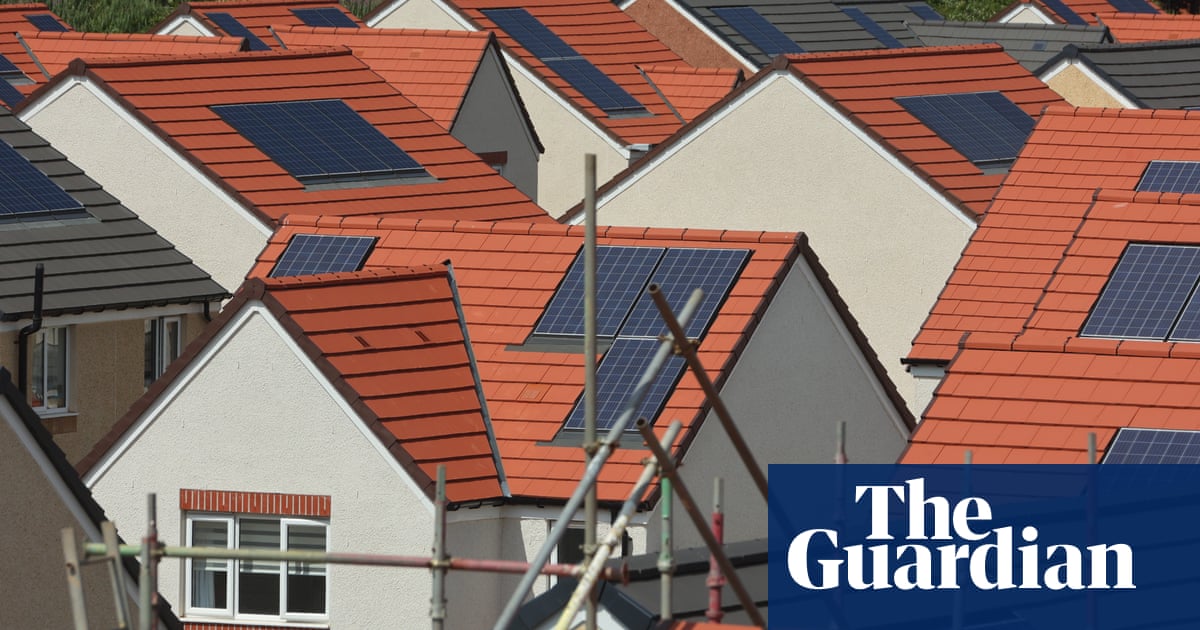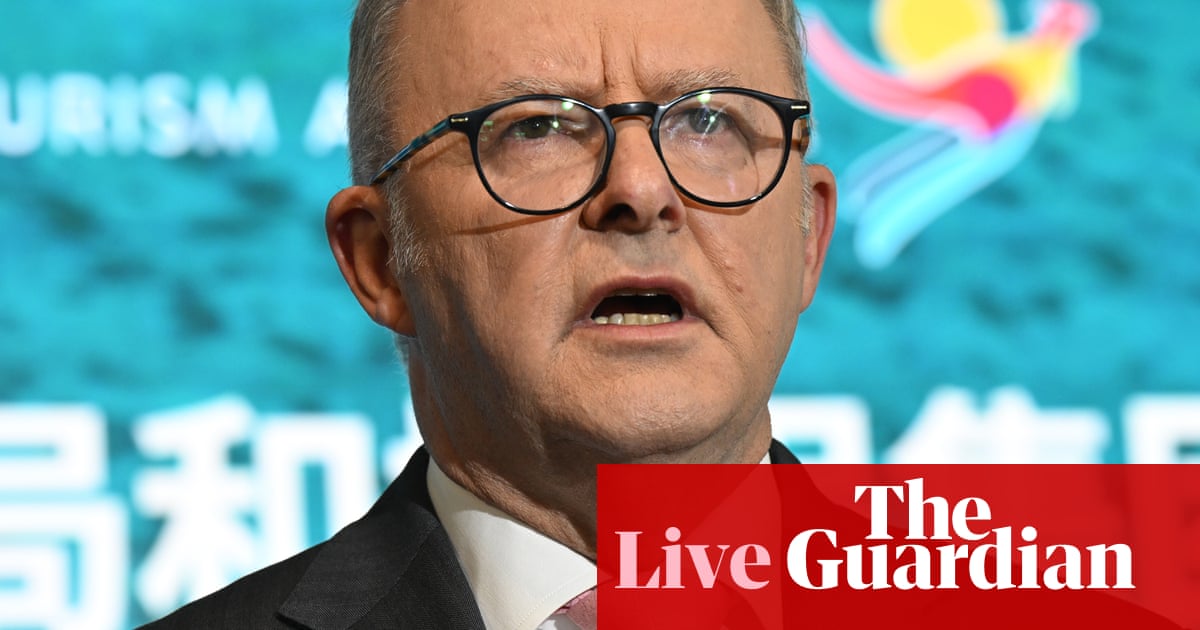As the UK prepares its next carbon budget, what needs to be included? | Green politics

Labour will next week be confronted with stark policy choices that threaten to expose the fault lines between the Treasury and the government’s green ambitions, as advice for the UK’s next carbon budget is published.
Plans for the energy sector, housing, transport, industry and farming will all be called into question in a sweeping set of recommendations for how the UK can meet the legally binding target of net zero greenhouse gas emissions by 2050.
Ministers will be given hundreds of pages of advice on steps they need to take for an expected reduction of emissions to about a quarter of today’s levels by 2040. The seventh carbon budget, which will be published on Wednesday, is the latest in a series stretching back to 2008.
The timeframe for this advice goes far beyond the usual political horizon: the budget will set carbon levels from 2038 to 2042. But the Climate Change Committee, the statutory adviser under the Climate Change Act, is expected to warn that the UK is already falling badly behind.
Although the CCC cannot prescribe policy, it can make recommendations and set out the limits within which the government can act – for instance, if airports are expanded and people take more flights, there will need to be much deeper cuts to carbon elsewhere in the economy.
For that reason, the advice is likely to make uncomfortable reading for senior ministers. Green campaigners and businesses have grown increasingly alarmed at the rhetoric from sections of the cabinet, which has sometimes seemed to pit economic growth against environmental aims.
Doug Parr, the chief scientist at Greenpeace UK, warned of a “growth at all costs, growth is king narrative” that was painting climate and nature concerns as a hindrance.
Some recent decisions – to greenlight a new runway at Heathrow, and to continue subsidising the tree-burning power station Drax, albeit at a lower rate than before – have been protested against. Far worse has been the rhetoric: Rachel Reeves, the chancellor the exchequer, alarmed many when she said planning reforms would let developers “focus on getting things built and stop worrying over the bats and the newts”.
The economic arguments for climate action are clear and well-established. Mike Childs, the head of science, policy and research at Friends of the Earth, said: “The cost to the global economy [of failing to control temperature rises] could reach $38tn a year, according to research published in 2024. In the UK, about 6.3 million households are currently at risk of flooding, which could rise to around 8 million by 2050, according to the Environment Agency. It is not just economically prudent to invest in reducing carbon emissions – it would be extreme economic folly not to do so.”
Several other big decisions are still in play, including regulations on housebuilders to make new-build homes low-carbon, and a review of nature and farming regulation. But most divisive of all is likely to be the decision over new oil and gas fields in the North Sea, many of which – including one of the biggest, Rosebank – are already in the licensing system. As Labour’s manifesto commitment was to award no new licences without revoking current ones, some in government are arguing for Rosebank to go ahead.
Pitting green as the antithesis to growth also risks alienating business, says Rachel Solomon Williams, the executive director at the Aldersgate Group of companies that push for a green economy. “To create a strong and resilient economy we need to be taking the lead in the low-carbon sectors that will drive sustainable growth in the future,” she said. “Businesses across the country want to see a regulatory and policy landscape that rewards ambition and innovation in the private sector, rather than a race to the bottom.”
With the UK well off track to meet its current carbon budgets, more action will be needed in the short and longer term, in every sector of the economy, involving changes to nearly every aspect of our lives from how we live at home to how we get around, what we work on and what we eat.
Ministers must set the seventh carbon budget by the end of June 2026. They are likely to accept the recommended overall carbon target, but the detailed policy advice will be up for grabs. A spokesperson for the Department of Energy Security and Net Zero said: “We are committed to meeting our ambitious targets. Britain is back in the business of climate leadership because the only way to protect current and future generations is by becoming a clean energy superpower and leading global climate action.”
Energy
If the government meets its target of decarbonising the electricity system almost completely by 2030 – a very large “if” – that will not be the end of the story. Electricity supply must roughly double to meet future demand. Ed Matthew, the director of the UK programme at the E3G thinktank, said: “The power system is key because both heating and transport and about two-thirds of industry will need to be electrified. The 2030 target is really just the start of the electrification journey.”
Grid upgrades will be needed, along with more focus on demand management, and storage will be key. E3G is calling for more investment in hydrogen, which can be stored in solid or liquid form for producing energy on demand.
Homes
Home heating makes up roughly 18% of the UK’s greenhouse gas emissions, largely from using gas. By the 2040s, most homes will need to be using heat pumps, but their takeup has so far been stubbornly slow. Last summer, only about 250,000 homes were using heat pumps.
They are more expensive to install than gas boilers and are still not as cheap to run as they should be, because the way the UK’s electricity market works makes electricity much dearer compared with gas. There are even question marks over whether new homes will be built with heat pumps under forthcoming building regulations called the “future homes standard”.
Ed Miliband, the energy and net zero secretary, sounded lukewarm on the technology recently when he told a select committee: “I am very wary of saying that we will stop people having gas boilers at a point when we cannot guarantee that heat pumps will be cheaper for people.”
Yet there are no real alternatives to mass heat pump installations if the UK is to be weaned off gas. The CCC is expected to make this point forcefully.
Industry
Giving up fossil fuels in industry will require far more electrification and investment in new technologies, such as electric arc furnaces for steel-making; hydrogen for use in chemicals, plastics and fertilisers; and low-carbon versions of cement. For some industries, the only option will be carbon capture and storage, to which the government will devote more than £20bn in the next two decades.
All of this will require investment, but few private sector companies are taking the steps needed. Some are likely to be waiting to see what help the government might offer; others may be in engaged in a game of chicken, trying to bully ministers into watering down the UK’s net zero commitments.
Williams, of the Aldersgate Group, said: “By making clear that it’s firmly committed to rapid decarbonisation, the government will provide much-needed economic certainty that will ultimately drive investment and generate prosperity.”
Transport
From 2035, it will be impossible to buy a new petrol or diesel car. Most of the UK’s 30m-strong fleet is likely still be reliant on fossil fuels for some years after, however. Electric vehicles are also no panacea: they still produce significant air pollution and are becoming heavier along with conventional cars.
If decarbonisation targets are to be met, people will need to use public transport far more in future. This should also stimulate economic growth – according to the National Infrastructure Commission, the UK lags badly behind other European countries in the availability of public transport in many of its major regional cities, and this is a major brake on productivity.
Although the government has begun to take the railways back into public ownership, returned bus services to regulatory oversight and backed an Oxford-Cambridge corridor, there is little sign of the joined-up national public transport strategy and investment in local networks such as trams that experts say is needed.
Farming
Hooting tractors jamming Whitehall in protest at the removal of inheritance tax breaks have set the tone for this government’s relationship with farmers. Yet farmers are vital to any net zero strategy, to grow more trees, preserve and re-wet peatlands, and reduce the increasing share of emissions from agriculture – which has already overtaken electricity and will be the biggest source of greenhouse gases in just over a decade, according to analysis from the Energy Climate Intelligence Unit.
Methane, a powerful greenhouse gas of which animal manure is a leading source, must be tackled as a matter of urgency if the world is to avoid the worst ravages of climate breakdown.
Action is also in farmers’ own interests, according to Tom Lancaster, an analyst at the ECIU. “Farming is the sector perhaps most exposed to the risks of climate change. We’ve just seen one of the worst harvests in decades in the UK, as farmers battled through the wettest 18 months on record and relentless winter rainfall, made worse by climate change,” he said. “We will only see more terrible harvests and flooded and drought-stricken farms in the future if we don’t do more now to move faster towards net zero.”
Behavioural change
The last government refused to countenance any message that people would have to adapt their behaviour in order to bring down carbon emissions. But all the analysis from the CCC so far shows that, without changing consumption, it will not be possible to create the low-carbon society needed. This need not be drastic, and it would be good for us: walking more, cycling where possible, taking public transport instead of the car, and eating less meat would all improve most people’s health.
Getting across that message will face deep-seated obstacles, however, including accusations of nanny state-ism – and Keir Starmer’s claim that carbon targets can be reached “without telling people how to live their lives”. Childs, at Friends of the Earth, said proving the benefits was key: “The policy pathway for meeting our carbon budget must not only be robust enough to achieve them – it must also make people’s lives tangibly better, if the mandate for change is to remain strong.”
Source link






